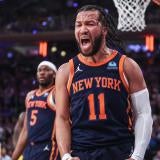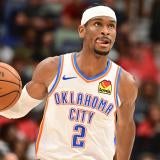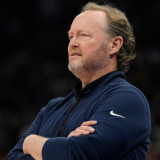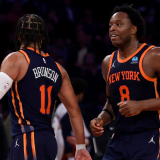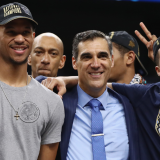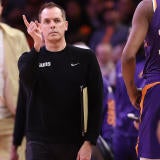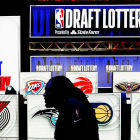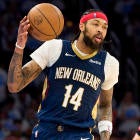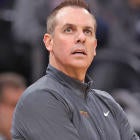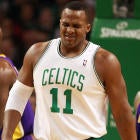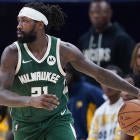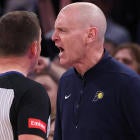The Cleveland Cavaliers killed the Toronto Raptors in a second-round sweep, and now all of the questions surrounding them can be boiled down to this: Are they extinct now?
The Raptors were never supposed to be here. When beloved executive Masai Ujiri took over from Bryan Colangelo in the summer of 2013, the conventional wisdom was that he'd tear the whole thing down. He didn't, but he came close; Kyle Lowry packed his bags anticipating a trade to the Knicks and DeMar DeRozan told Ujiri he didn't want to stick around if the front office decided to chase lottery balls. Everything that has happened since then has been the result of a happy accident, and this summer will force Ujiri to make difficult decisions.
The embarrassing nature of Toronto's playoff exit means Ujiri could justify starting over. In assessing the Raptors' future, it's worth taking a look at their past.

The last time Toronto was swept in the playoffs, it was in 2015 at the hands of the Washington Wizards in the first round. Like this year, one could point to a Lowry injury as an excuse, although he played through it that time. Another parallel: the defeat was a year after the Raptors had rewarded coach Dwane Casey with a contract extension.
Ujiri would have faced little criticism had he fired Casey. Toronto was supposed to build on its first playoff appearance since 2008, but instead it completely fell apart against the Wizards. Washington went small, played aggressive defense and dominated.
Rather than making sweeping changes, though, Ujiri chose to make tweaks. Casey returned, but with three new assistant coaches. On draft night, the Raptors sent Greivis Vasquez to the Bucks in a draft-night trade that has become sort of legendary, bringing back No. 46 pick Norman Powell and clearing cap space. In free agency, Toronto signed DeMarre Carroll, Bismack Biyombo, Cory Joseph and Luis Scola. It also re-signed Jonas Valanciunas for four years and $64 million.
Ujiri gave the defensive-minded Casey what he needed: a more balanced team. The Raptors let the defensively deficient Lou Williams, the reigning Sixth Man of the Year, sign with the Los Angeles Lakers for less than they paid Joseph. The implication was that, with this roster, they better make strides.
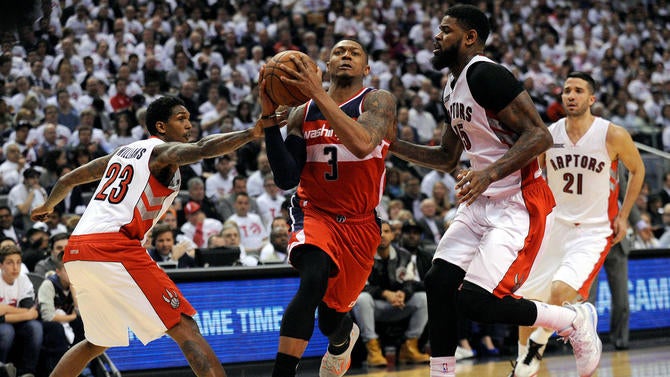
That summer, though, Toronto wasn't quite at a crossroads. There were rumblings that Ujiri could shake things up, but it was his choice -- both of his stars were under contract. The last time the future of the Raptors was truly up in the air was a year earlier. Toronto had made an improbable push for the playoffs, but several of the players who helped them do it were hitting free agency.
Despite losing Game 7 to the Nets at home in the first round, the Raptors were finally going somewhere. As such, the front office chose to bring the whole band back. Casey got an extension, Lowry signed a four-year deal for $48 million with a player option on the final season. Patrick Patterson and Greivis Vasquez re-signed, too, and Ujiri took Lou Williams and Lucas Nogueira from the Hawks for cap relief in the form of John Salmons' contract.
The only other significant addition was forward James Johnson, but this felt like a landmark summer for the franchise. Lowry leaving would have made the return to the playoffs seem meaningless and triggered more discussions about rebuilding. His decision to stay is the main reason the team is still relevant now.
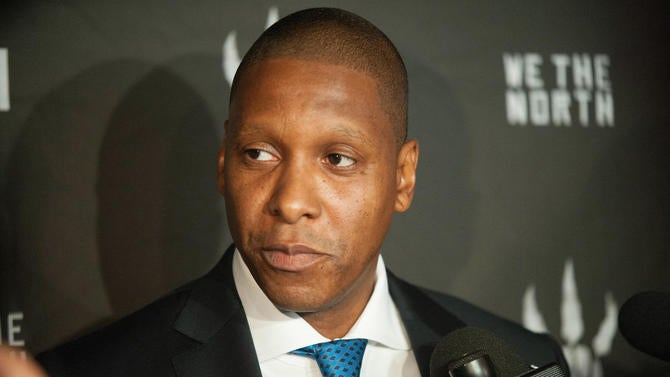
To find the most analogous situation, though, you might have to go deeper into Toronto's history. You remember Vince Carter dueling with Allen Iverson in the 2001 playoffs, going to his graduation the morning of Game 7 and missing the turnaround jumper that could have taken the Raptors to the conference finals? That 47-win season seemed like the start of something special, and the front office invested an enormous amount of money the following offseason in order to keep it going.
Antonio Davis signed a five-year deal despite being a few months away from turning 33 years old. Fan favorite Jerome Williams signed a seven-year deal that overvalued his contributions as an energy guy. Alvin Williams signed a five-year deal, but knee injuries essentially ended his career about halfway through it. Hall of Famer Hakeem Olajuwon also came to Toronto in a sign-and-trade at 38 years old on a three-year deal, though he wound up retiring after appearing in 61 games and starting only 37 of them.
All of these signings showed that ownership was on board with paying what it takes to be a competitive team, and it convinced franchise player Vince Carter to sign a six-year, $85 million extension. The day it was announced, the mayor declared it was Vince Carter Day.
"A huge part of the decision for me was the direction of the team," Carter said at his press conference. "Are we putting ourselves in a position to contend year after year? With the job Glen did this summer, I think we've done that. It sends a message to the rest of the league, and I wanted to reinforce that message today."
Toronto seemed like it was on the rise, but that core's best days were already behind it. Those contract commitments took away the front office's financial flexibility, and after sneaking into the playoffs the following year with Carter injured, everything disintegrated.

The connection to this season is simple. To retain all or most of the Raptors' important players back would be extremely expensive, with Lowry, Ibaka, Patterson and P.J. Tucker hitting free agency and $65.6 million already committed to DeRozan, Valanciunas, Carroll and Joseph next season. As ESPN's Zach Lowe noted, keeping everybody would put them at least $30 million over the luxury tax, which is crazy for a team that doesn't make the Cavaliers nervous.
Unlike 2015, Toronto no longer has cap space to chase free agents. Unlike 2014, it is not the new guy in the Eastern Conference's playoff picture. DeRozan is already making more than $27 million per season, and Lowry will command significantly more than that. If the Raptors want to keep tweaking things the way they have since Ujiri arrived, they will also have to sacrifice a couple of rotation players in salary-clearing trades. The most obvious candidates are Valanciunas and Carroll, but moving them will not necessarily be easy.
Over the past few years, Casey has repeatedly called Toronto a work in progress. On Sunday, he said the team was still "knocking on the door." The reality, though, is that the Raptors fell short. They failed to take a step forward despite having the best and deepest roster they've ever had. Progress isn't always linear, but it's hard to envision a path that takes them past the Cavs in the next couple of years. The 31-year-old Lowry wants a ring, and he'll have to figure out whether or not he truly thinks this franchise can help him get one.
Fortunately, Toronto is not stuck in purgatory or mired in mediocrity. This might be the second-best team in its conference, and it was one of three teams to finish in the top-10 of both offensive and defensive efficiency. Maybe they can be similar to Dirk Nowitzki's Mavericks, a perennial playoff team that won the 2011 NBA Finals a year after losing in the first round (with Casey on the coaching staff). Maybe they'll be more like the grit-and-grind Grizzlies, who only reached the conference finals once. Would that be so bad? It appears that two superteams will meet in the Finals for the third straight season, but does that the other 28 teams should be rebuilding?
While changes are surely coming for the Raptors, no one knows how drastic they will be. If Lowry leaves, then this era will be effectively over, perhaps inspiring an overhaul. If he stays, then Ujiri will be challenged to make this machine leaner and meaner. That would be his biggest test yet.







